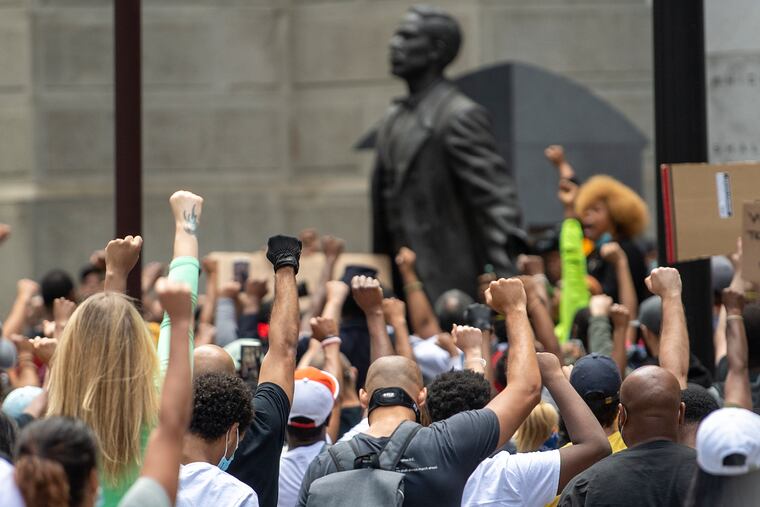Voting is your battle cry against injustice | Opinion
We are all trying to dismantle injustice brick by brick. Here's how you can help.

Many years ago, Ismaaiyl Brinsley thought revenge was the proper response to injustice. He took matters into his own hands and, in seeking justice for Michael Brown and Eric Garner, shot two innocent New York City police officers. Pursued and cornered, he committed suicide.
This summer, global protesters thought marches of dissent were the proper response to injustice. And in seeking justice for the death of George Floyd, they disrupted business as usual in cities across the world. The eyes of the world riveted by the display of their anger and shouts of, “No justice, no peace.”
Yet, injustice is not merely the absence of justice. Injustice is a system with its own playbook. Starting to reform that system, bit by bit, is one of the issues we debated this summer, and is on the ballot this fall.
It’s also an old story. Read the histories of the enslaved and of the colonized, and you find the same story of a system that, by design, created a permanent underclass and a permanent class of prosperity that enriches the few and impoverishes the many. It establishes a small, comfortable upper-level elite who create the intellectual justifications for injustice, and a middle-level administrative class who police and maintain the masses in exchange for a living wage. Then there are the rest who are immiserated by and then disposed of by the injustice system.
» READ MORE: Everything you need to know about voting by mail, or in person, in Pennsylvania
Because injustice everywhere is a threat, it is protected by violence. The United States, when compared with the rest of the developed world, has a much higher rate of violence, especially gun violence. Research has shown that eight out of every 10 people killed by a firearm in a high-income country are from the United States. This, too, is American exceptionalism.
There is also the violence of complicit silence. Haile Selassie explained it this way: “Throughout history, it has been the inaction of those who could have acted; the indifference of those who should have known better; the silence of the voice of justice when it mattered most; that has made it possible for evil to triumph.”
But this is too harsh a tale for America’s sensibilities. James Baldwin once said for the sake of maintaining a simple narrative, America has an aversion to history. Instead, when reality becomes uncomfortable, we insert tranquilizing myths of a past that never existed. This is why we answer calls for social justice with retorts for more law and order — a poisonous concept that has fueled too much police-involved lethal violence.
Take Breonna Taylor, for example. A working woman with dreams was asleep in her home when intruders forced their way inside, and in the chaos that followed, she was killed. For the masses, that the intruders were police aided by the court system with a “no-knock warrant” is the tale of abuse of policing power that demands an answer. An injustice system doesn’t provide satisfactory answers, and no one is held responsible for her death.
Injustice is the root cause of every inequality, any disparity. For example, Branko Milanovic, author of The Haves and the Have-Nots as well as a World Bank economist, explained why it is easier to get foundation and think tank money to study poverty rather than income inequality. Poverty alleviation, he explained, leaves those in power feeling good, but income inequality raises questions about the legitimacy of their income.
The Black Lives Matter campaign to say their names forces all of us to remember the victims of calamities, but they are also using the urgency each individual catastrophe creates to force the dismantling of the apparatus of white supremacy — a form of illegitimate power well-protected by domestic terrorism. FBI Director Christopher Wray testified before the House Homeland Security Committee in September that the racially or ethnically motivated violent extremist was the nation’s top domestic threat. “In fact, 2019 was the deadliest year for domestic extremist violence since the Oklahoma City bombing in 1995.”
» READ MORE: What brings U.S. together in ’21? Trump in jail? A Truth Commission? Or something else? | Will Bunch
I head the Pennsylvania Human Relations Commission, and like all human relations commissions across the country, my agency is called in to do a deep dive on issues of injustice. Our investigators look closely to determine if the circumstances were unjust or some other circumstances of misfortune. To be fair, the process is purposefully deliberative, which is demanding, and results take time. Yet, it is the closest we have come in this country to a Truth and Reconciliation Commission, like the restorative justice body assembled in South Africa after the end of apartheid.
We are all trying to dismantle injustice brick by brick.
On Nov. 3, we will go to the polls. Our vote is our battle cry. In unison, there is moral power that will force entire walls of injustice to come tumbling down. This is how the long arc of the moral universe will finally begin its bend toward justice.
Chad Dion Lassiter is the executive director of the Pennsylvania Human Relations Commission. classiter@pa.gov